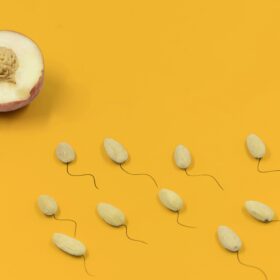
Types of assisted conception
In this article
What's the lowdown?
Assisted conception or assisted reproduction is a group of medical techniques that can help people to get pregnant
Assisted conception can be used by couples having fertility issues, same-sex couples or singles who wish to have a child
In vitro-fertilisation (IVF) is considered the most common and effective fertility method
What is assisted conception?
In this day and age, women do not let their fertility clock run their lives. The emergence and development of assisted conception methods has allowed couples to start a family if they are struggling to conceive, and even allows women to preserve their fertility so they can continue with their life plans on their terms.
Assisted conception refers to all fertility treatments which involve eggs or embryos. Interestingly, if there is only involvement of sperm or stimulation of the ovaries to release eggs, this is not considered an assisted conception treatment2.
The world of assisted conception can be extremely confusing as there are many different types. Let’s traverse this world together!
PS: You might hear assisted conception also being referred to as assisted production or assisted reproduction techniques (ART).
Assisted reproductive techniques may include:
- Intra-uterine insemination (IUI)
- In-vitro fertilisation (IVF)
- Intracytoplasmic sperm injection
- Pre-implantation genetic screening or diagnosis
- Egg freezing
- Sperm donation
- Egg donation
What is IUI?
IUI or intrauterine / artificial insemination is a more natural method of assisted reproduction. In this treatment type, the sperm is collected from a sample and examined. The better quality sperm are separated from sperm with motility or shape issues. Once these sperm have been isolated, the sample is directly injected into your womb at the time in your cycle when you release an egg (ovulate)3. Ovulation can be controlled or “induced” using medications, or your cycle can be tracked using at-home urine tests, blood tests or scans to work out when you are about to ovulate.
IUI can be carried out with either your partner’s or a donor’s sperm. IUI is recommended in cases where3:
- Couples are unable to engage in vaginal intercourse due to conditions like vulvodynia or vaginismus
- In those who have a condition like HIV where the sperm needs to be washed to prevent the passing of the disease
- Where there are no female fertility problems but donated sperm is needed for single women or same-sex couples to conceive
- Where there are no female fertility problems but known male fertility issues
What is IVF?
IVF is a common type of assisted conception for people who have trouble naturally conceiving. Medications and fertility hormones are given to women to stimulate the ovaries so several eggs mature at the same time. Medications are used to “trigger” these eggs to be released before an “egg retrieval”. The egg retrieval procedure can be uncomfortable and may be done using a strong sedative. Once the eggs are collected through the egg retrieval procedure, they are taken to a laboratory to be fertilised with sperm. The sperm is left with an egg in a petri dish to fertilise on its own4.
After successful fertilisation, the eggs are now called embryos. These embryos are left to develop for 2-6 days. An embryologist (a scientist who is a specialist in embryos!) then selects the highest quality embryo which is transferred back into the woman’s womb in a quick procedure4. Hormonal medication is used to make sure your womb lining is thick and developed enough to allow the embryo to implant and grow into a pregnancy.
If multiple embryos are created, they can be frozen and these frozen embryos can be used in future IVF cycles. Sometimes, with special consideration from the doctor, multiple embryos can be implanted, however, this can pose health risks as it increases the chances of having twins or triplets4.
What is ICSI?
50% of fertility issues in heterosexual couples are sperm-related5.
Intracytoplasmic sperm injection (ICSI) is a subset of IVF, which is opted for when there are issues with the sperm. If the sperm is identified to be of low motility or numbers, then the embryologist takes a single sperm and directly injects it into the egg to help with fertilisation into an embryo5.
What is pre-implantation genetic screening?
Pre-implantation genetic screening is used in fertility medicine to look for any genetic problems in the embryos created via IVF or ICSI. This is carried out by taking a small biopsy of some cells from an embryo and screening for conditions such as Down’s syndrome or Turner’s syndrome. It is not used to test for inherited conditions.
What is a pre-implantation genetic diagnosis?
If one or both genetic parents are known carriers of a genetic condition, a pre-implantation genetic diagnosis (PGD) can be offered. The genes of the embryos are checked for a specific genetic condition. PGD can check for any genetic condition as long as the specific gene they are looking for is known. It will be considered if the condition can be inherited by a child and poses serious risk to their health6. For example couples who are affected by, or are carriers for cystic fibrosis, faulty BRCA genes or sickle cell anaemia are eligible for PGD. The list for eligible genetic conditions is long, and a geneticist will be able to advise if a certain condition is covered.
What is egg freezing?
Egg freezing is an insurance plan for the future. Egg freezing has been important for young women undergoing cancer treatment which may affect their fertility, but is becoming more popular for women who choose to freeze their eggs for future use7. Egg freezing is available on the NHS if you are going through cancer treatment, but you have to pay privately if you are choosing to do this electively. If you are not ready to have kids at a young age, egg freezing allows you to collect eggs, freeze them and store them for when the time is right. It follows the first stages of IVF, but after egg collection eggs are frozen without being fertilised. As we know, our body’s are not the only ones that age, so do our eggs. This is why women, who know they want kids later on in life, may opt to freeze eggs when they are young so they have higher quality eggs for conception later8. It’s important to know, however, that freezing your eggs doesn’t always guarantee a pregnancy or a baby, with success rates of around one third for each cycle of treatment when ready to conceive, depending on the age your eggs were frozen.
What is a sperm donor?
Donating sperm is simple. It can either be directly donated to someone you know or have met via an introduction website. Alternatively, sperm can be donated for future use by someone you don’t know at a licensed fertility clinic. You cannot get paid for sperm donation but you can get a small reimbursement of around £35 for any costs or expenses needed to provide the sample10.
It is important to note that due to a change in the law in 2005, any child conceived with your sperm can access your identifiable details at the age of 18. So your identity will not always be kept a secret, a consideration to make when donating sperm11.
What is egg donation?
If women want to donate eggs, they go through part of the IVF process until they have their eggs collected. These eggs are stored carefully for future use by someone else12. Some women who have undergone IVF may choose to donate any remaining eggs or embryos in storage that haven’t been used to others.
The reason for donation is completely up to the donor. Some people donate to people they know who are having fertility problems or to the general public. Usually, clinics only allow women aged 18-35 to donate eggs12.
Have you heard of ‘egg sharers’? It refers to women who are undergoing IVF themselves who donate some of their egg supply to another woman in exchange for a discount or free treatment12.
Just like sperm donation, you cannot get paid to donate eggs according to the law. But there may be up to £750 compensation for any expenses such as travel or childcare costs12.
Summary
There are many types of assisted conception and many more to come, we’re sure, as there are many advancements being made in the fertility field.
Before you embark on your fertility journey, be sure to do your research and opt for a clinic you feel comfortable with. Fertility treatments may not only be expensive but also mentally and physically heavy. Be sure to go with a fertility team that has your best interest at heart.
Our medical review process
This article has been medically reviewed for factual and up to date information by a Lowdown doctor.

